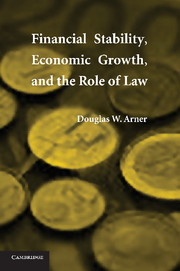Book contents
- Frontmatter
- Contents
- Introduction
- PART ONE FINANCE AND THE INTERNATIONAL FINANCIAL ARCHITECTURE
- PART TWO FOUNDATIONS OF FINANCE
- 3 Preconditions for and Institutional Underpinnings of Finance
- 4 Central Banking and Financial Policy
- 5 Financial Infrastructure
- PART THREE FINANCIAL REGULATION AND SUPERVISION
- PART FOUR LOOKING FORWARD
- Index
4 - Central Banking and Financial Policy
Published online by Cambridge University Press: 25 July 2009
- Frontmatter
- Contents
- Introduction
- PART ONE FINANCE AND THE INTERNATIONAL FINANCIAL ARCHITECTURE
- PART TWO FOUNDATIONS OF FINANCE
- 3 Preconditions for and Institutional Underpinnings of Finance
- 4 Central Banking and Financial Policy
- 5 Financial Infrastructure
- PART THREE FINANCIAL REGULATION AND SUPERVISION
- PART FOUR LOOKING FORWARD
- Index
Summary
At the same time as one considers the institutional foundations of financial sector development and economic growth, it is also necessary to consider issues relating to macroeconomic policy. In this context, an economy's central bank plays a leading role.
Unlike institutional underpinnings of financial sector development, macroeconomic policy issues have long received significant attention. As a result, this area includes a number of international standards. However, the Financial Stability Forum (FSF) framework addresses only institutional arrangements for and transparency of macroeconomic policy – it does not address policies themselves, reflecting the largely legal and institutional focus of the system of standards and codes, as well as the focus of this volume. Specifically, the FSF includes “macroeconomic policy and data transparency” as one of its major subject areas, subdivided in turn into four standard areas, the first three of which are identified as key standard areas: (1) monetary and financial policy transparency, (2) fiscal policy transparency, (3) data dissemination and (4) data compilation. Fiscal policy transparency was addressed in the previous chapter in the context of sustainable fiscal and taxation systems; the remainder are dealt with below.
CENTRAL BANKING
Central banks historically have incorporated a number of different functions, including currency issuance, monetary policy, banking supervision and/or regulation, financial stability and lender of last resort, the government's bank, management of gold and foreign exchange reserves, debt management, responsibility for exchange controls, and various developmental and promotional tasks. Typically, a central bank is defined as such.
- Type
- Chapter
- Information
- Financial Stability, Economic Growth, and the Role of Law , pp. 126 - 153Publisher: Cambridge University PressPrint publication year: 2007



